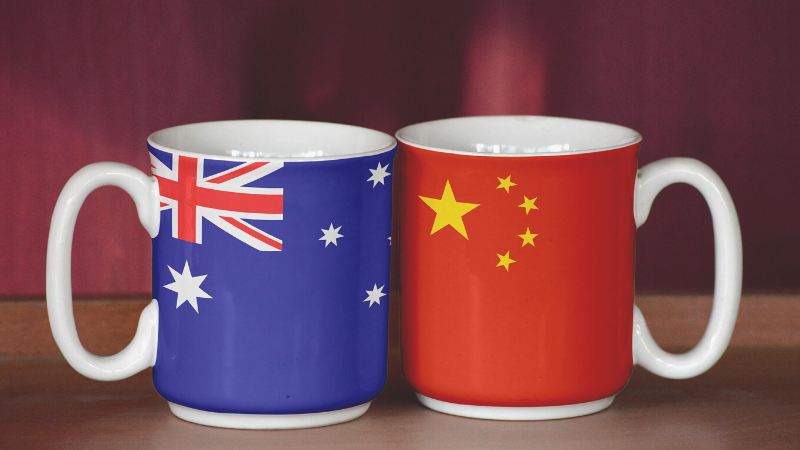Perspectives | The PRC’s fragmented political system: Implications for Australia
August 05 2021

Perspectives is UTS:ACRI's commentary series, featuring a piece on a topical subject in the Australia-China relationship from an invited expert contributor.
By Colin Hawes
Many media commentators and Western politicians think there is a unified Communist Party of China (CPC) with well-defined aims and the ability to achieve those aims whenever it wants to, either openly or covertly. Take, for example, the BBC: ‘The Communist Party of China is in complete control of the country, from government to police to military. With some 90 million members, it is organised like a pyramid, with the politburo and … President Xi Jinping at the top.’
Some assume that the CPC’s ‘common’ aims and ‘unified’ strategy have perniciously extended beyond the People’s Republic of China’s (PRC) borders. Former US Secretary of State Mike Pompeo declared in a July 2020 speech, ‘We opened our arms to Chinese citizens, only to see the Chinese Communist Party exploit our free and open society. … If we don’t act now, … the CCP will erode our freedoms and subvert the rules-based order that our societies have worked so hard to build.’
Likewise, after Darwin Port was leased to the Landbridge Group – a private company based in Shandong – Peter Jennings, head of the Australian Strategic Policy Institute, opined: ‘It’s all part of a broader Chinese strategy of strengthening their influence throughout the Asia-Pacific and really can't just be seen simply as a commercial investment. There’s more to the strategy than that.’
Of course, the CPC desperately wants both Chinese people and outsiders to believe the Party is immovably strong, speaking and acting with one voice, safe from challenge by all internal and external enemies.
But we should not be fooled by their propaganda as it contradicts overwhelming empirical evidence to the contrary. In fact, there are countless subgroups and networks competing fiercely – sometimes viciously – with each other for resources and influence, using their discretion to oppose or subvert Party policies, abusing their power to engage in self-interested corruption, or co-opting local Party organisations to increase their corporate power and profits.
Let’s take the power industry in the PRC as an example. Though dominated by state-owned enterprises (SOEs), it has routinely ignored CPC and central government orders to stop building massive coal-fired power stations that worsen the PRC’s environmental crisis. Between 2005 and 2007, at least 123 massive coal-fired power stations were illegally completed or under construction by SOEs.[1] Similar violations continue to occur under Xi Jinping, supposedly the ‘most powerful Chinese leader since Chairman Mao.’ Despite a central government moratorium on new coal-fired power stations in 2016 due to massive over-capacity, and direct prohibitions from central government regulators to halt unauthorised projects under construction, satellite photos showed that work was continuing on numerous illegal coal-fired power stations, and some local PRC media even praised the rapid construction progress that was being made.
As recently as January 2021, a scathing report by the CPC’s Central Environmental Protection Inspection Group found that 22 major coal-fired power stations and numerous large-scale coal mines had been constructed since 2016 without completing the required environmental assessments; several provincial coal-fired power stations had exceeded their coal-burning quotas by over 30 percent; and older highly-polluting coal-burning facilities had not been decommissioned as ordered.
How could this widespread defiance of central regulators and CPC discipline occur in a supposedly authoritarian system in which, as one study claims, ‘state-owned firms are business units/subsidiaries … of the Party, with the Party leader being the CEO of China, Inc.,’ and ‘the privilege to run a business comes with the responsibility to do what the Party-State asks the business to do’?[2]
Academics Tun-jen Cheng and Chung-Min Tsai explain it by pointing to an unholy ‘tripartite relationship’ among SOEs, local governments, and central regulators, where SOE executives lobby the central government for corporate-friendly policies and collude with local governments to challenge or ignore regulations that reduce their opportunities for generating rent-seeking income – i.e., feathering their own nests.[3]
This is not just a problem in the power industry. Throughout the PRC, local governments and corrupt central government officials/regulators have colluded to approve unnecessary infrastructure projects, with the aim of inflating GDP numbers and dividing up illicit profits to related parties. This wasteful spending is compounded by a skewed incentive system that rewarded local officials with promotions for increasing GDP in their regions, what economics scholars have called a local GDP ‘promotion tournament.’
The result of all this unregulated spending has been a colossal waste of resources and a systemic local government debt crisis. Chinese economists have estimated that at least US$6.9 trillion was wasted on ‘ineffective investment’ in infrastructure between from 2009 to 2013 alone with no foreseeable economic returns.
It is even harder for the CPC to keep track of what happens overseas. Numerous so-called ‘Belt and Road Initiative projects’ have failed due to poor planning or corruption. For example, the privately controlled CEFC Group was widely viewed as a PRC government agent as it spent billions acquiring overseas oil and financial assets over a decade. But its CEO was arrested for corruption in 2018, as it had illegally borrowed over US$15 billion from the China Development Bank. The Bank’s CEO was also jailed for life for accepting huge bribes.[4] If this is part of a clever CPC strategy to ‘strengthen their influence’ it is a puzzling way to go about it.
Corruption remains a huge problem in the PRC, seriously weakening the CPC’s control. Around 2.9 million public officials have been penalised for corruption or leading extravagant lifestyles between 2012 and 2020, including criminal prosecutions of dozens of CPC leaders, not to mention senior military and security officials. That means approximately one in every 14 of the PRC’s 40 million Party and government officials has been disciplined for corruption-related behavior, and the anti-corruption campaign still continues.[5] All of them were paying lip service to the CPC while secretly benefiting their own interests (and those of favored corporations) in ways that often obstruct or harm the Party’s interests.
This is why seasoned experts on PRC politics, who have spent years engaging in field research and observation of PRC government behavior at all levels of society, use paradoxical terms such as ‘fragmented’ or ‘decentralised’ authoritarianism, ‘local experimentation’, competing ‘vested interests’, ‘bureaucratic bargaining’ between ‘policy entrepreneurs’ and a ‘field’ or dynamically fluid ‘braided stream’ of continually interacting ‘ad hoc and contingent’ ‘contradictions’ to describe the actual operation of the Party-state system.[6]
For Australians, it is crucial to factor in this fragmentation when formulating our policies towards the PRC, and not imagine sinister CPC guiding hands behind every bush. For example, Landbridge’s investment in Darwin Port would have been approved by the provincial government in Shandong, not by the central CPC. As a private firm, Landbridge would be focused only on financial returns. It may grease the wheel by sharing profits with local officials in its home base of Rizhao City and the Shandong provincial government. The central CPC, as it desperately seeks to resolve trillions of dollars of local government debt, counter a national environmental crisis, and keep track of millions of self-interested officials, has no time to fry such a small fish.
Colin Hawes is an Associate Professor in the Law Faculty at the University of Technology Sydney (UTS) and a Research Fellow at the Australia-China Relations Institute at UTS.
Sources
[1] Tun-jen Cheng and Chung-min Tsai, ‘Powering rent seeking in the electricity industry’, Rent Seeking in China, Abingdon, Routledge, 2009.
[2] Shaomin Li and Matthew Farrell, ‘The emergence of China, Inc.: Behind and beyond the trade war’, International Journal of Emerging Markets, May 2020.
[3] Tun-jen Cheng and Chung-min Tsai, ‘Powering rent seeking in the electricity industry’, Rent seeking in China, Abingdon, Routledge 2009.
[4] See Colin Hawes, The Chinese corporate ecosystem (forthcoming, Cambridge University Press), Chapter 6.
[5] Figures for corruption calculated by the author from PRC government sources. See also Burns, ‘Civil Service Reform in China’, OECD Journal on Budgeting 7.1, 2007. If all SOE employees were included, to make a total of approximately 70 million public and SOE employees/officials, it would still mean that one in 24 of these employees/officials has been disciplined for corruption; William Zheng, ‘No let-up for corrupt ‘tigers’ in 2018 as China’s graft-busters claim more big scalps’, South China Morning Post, January 1 2019 <https://www.scmp.com/news/china/politics/article/2180294/no-let-corrupt-tigers-2018-chinas-graft-busters-claim-more-big>.
[6] Kjeld Erik Brødsgaard, Chinese politics as fragmented authoritarianism, Abingdon, Routledge, 2017; Kenneth Lieberthal and David Lampton, Bureaucracy, politics, and decision making in post-Mao China, Berkeley: University of California Press, 1992; Pierre Landry, Decentralized authoritarianism in China: The Communist Party’s control of local elites in the post-Mao era, Cambridge: Cambridge University Press, 2012; Andrew Mertha, ‘Fragmented authoritarianism 2.0: Political pluralization in the Chinese policy process’, The China Quarterly 200, December 2009; Patricia Thornton and Vivienne Shue, To govern China: Evolving practices of power, Cambridge University Press, 2017.

